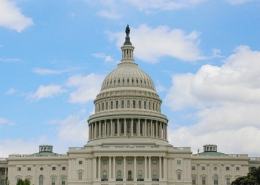A partial government shutdown starting next weekend seems likely as House leaders seem powerless to avert it. Meanwhile, Senate leaders yesterday took steps to provide a shutdown-ending option that would also erase 200-some years of House prerogatives in the spending process.
Our summary of how a shutdown will affect transportation programs (if a shutdown occurs) is here.
The problem, in essence, is this. The federal fiscal year expires at midnight on September 30, and with it, the legal authority to pay most federal workers also expires. Some kind of legislation extending that authority needs to be enacted or a partial shutdown will be fully felt on Monday morning, October 2. What’s stopping it?
- All of the spending bills being brought before the House – short-term and long-term – have been filled with so many red-meat GOP social issue provisions, or severe spending cuts, or both, that it is easy for Democrats to maintain complete party unity and just vote “no.”
- Zero Democratic support means that near-unanimous Republican support is necessary to pass anything.
- There are several different, sometimes overlapping groups of five to ten Republicans each who are willing, perhaps eager, to shut the government down rather than accept any kind of funding legislation that does not meet their personal criteria. Any one of those groups can, in the face of unified Democratic opposition, prevent the House from taking any action.
- Some of those Republicans want a shutdown so that they can force Speaker McCarthy to end the shutdown by passing a bill that can get Democratic votes, an act which they will then use to try to force McCarthy from office.
Here’s the math. There are currently 433 House members – 221 Republicans, and 212 Democrats (currently, there is one vacant seat previously held by each side).
433 divided by two is 216.5, so a majority of the House, if everyone is voting, is currently 217 votes.
But a few members were absent this week. Majority Leader Steve Scalise (R-LA) was out getting chemotherapy. Mary Peltola (D-AK) had to fly home because her husband died in an airplane crash. Marcy Kaptur (D-OH) had COVID. Frank Lucas (R-OK) got gored by a bull (no joke – fractured pelvis). And Anna Paulina Luna (R-FL) gave birth to a child on August 26 and was down with an opportunistic postpartum infection of some sort.
Kaptur, Lucas, and Luna have all announced that they are returning to DC next week to be available in case their vote is needed on shutdown-related issues. No word yet from Peltola, and Scalise is day-to-day. (As anyone who has known someone who had chemotherapy can tell you, there are some days you can go out and do things and some days you can’t, and it all depends on the timing of the doses.)
Before the August recess, House leaders failed to bring up and pass the Agriculture appropriations bill because their behind-the-scenes vote count told them that it would not pass. Once Congress came back from recess, they tried to bring up the Defense appropriations bill instead, which is usually one of the easiest to pass, but the House first had to pass a special procedure to bring up the bill and limit amendments.
On September 19, they fell just two votes short, 212 to 214, with five Republican “no” voters (Biggs (AZ), Bishop (NC), Buck (CO), Norman (SC), and Rosendale (MT) joining all 209 Democrats in opposition.
Two days later, the leaders tried again, and this time an identical procedural vote went down, 212 to 215. This time, the five “no” votes were Biggs, Bishop, and Rosendale again, plus Crane (AZ) and Greene (GA) replacing Buck and Norman, who voted yes the second time. (House Rules Committee chairman Tom Cole (R-OK) then switched his vote to “no” to make him eligible to call the thing up for a possible re-vote in the future.)
All this time, the underlying stopgap continuing resolution (CR) to avoid a government shutdown was on hold, because the private whip count said it was even shorter of votes, but that if they could get the defense bill passed, that might help the vote count for the CR.
[sigh]
That first CR (text here) wasn’t even a product of the Appropriations Committee, instead being introduced by another group of angry backbench Republicans led by Byron Donalds (R-FL). That CR cuts all accounts except defense, disaster relief, and veterans by 8.1285 percent, does not include any account-level “anomalies” requested by the White House, and does not include any supplemental money for natural disasters or Ukraine. What it does include is the GOP’s giant, multi-committee border security and immigration reform bill (H.R. 2) that passed the House on May 11 without a single Democratic vote.
There is no reason to assume that House Democrats will vote for a package containing H.R. 2 and an 8.1 percent across-the-board funding cut, even if it does avert a shutdown, and Senate Democrats definitely won’t. So far, there is no sign of any other CR text from House Republican leadership.
Instead, Speaker McCarthy has bowed to the “no” voters and is trying to pass as many of the 11 remaining annual appropriations bills as possible between now and September 29, in the hopes that this will get two or three holdout R’s to vote for a CR to be named later by that point. This seems unlikely, as the House lacked the votes to pass the Agriculture bill just six weeks ago, on substantive grounds that had nothing to do with a shutdown.
The House Rules Committee is meeting as of this writing (Friday afternoon, September 22) to try and write a rule restricting amendments and making the Defense, Homeland Security, Agriculture, and State/Foreign Operations appropriations bills available for individual debate in the House starting on Tuesday, September 26. (Yom Kippur is inconveniently timed this year, taking Monday out of the last work week of the fiscal year.)
Meanwhile, in the Senate….
Yesterday, Senate Majority Leader Chuck Schumer (D-NY) unexpectedly moved that the Senate take up the House-passed aviation reauthorization bill (H.R. 3935) and then filed a cloture petition on his motion. The Senate will vote on this cloture petition at 5:30 p.m. on Tuesday the 26th, and if that motion gets 60+ Senators, Schumer will tee up that bill for debate for the remainder of the week as a way to avert or end the shutdown.
Schumer told CNN’s Manu Raju today that he is negotiating with Republican Leader Mitch McConnell (R-KY) on how to use the House-passed FAA bill as a vehicle to stop a shutdown and do other things. Schumer intends to strip out the House-passed multi-year FAA reauthorization language and replace it with at least some of the following:
- A short-term CR of up to three months, with anomalies for accounts that need special treatment to function normally under a CR, and without any across-the-board funding cuts.
- Another package of Ukraine aid requested by the White House.
- A package of disaster relief funding requested by the White House but also beefed up by demands of specific Senators (California, Hawaii, etc.)
- A short-term extension of Airport and Airway Trust Fund taxes and spending authority, necessary to prevent a FAA shutdown and keep airlines from receiving a tax windfall.
- A short-term extension of the farm bill.
The fact that Schumer chose H.R. 3935 means that he is looking at least at #1 and #4, because he said he was using it as a CR vehicle, and because it is one of the few House-originated tax bills, and the FAA extension has to ride on a House-originated tax bill.
The Constitution requires that all “bills raising revenue” originate in the House, and this means that they have to have a H.R. bill number and they had to have tax provisions in them when the Senate got the bill. H.R. 3935 qualifies, because section 1202 of the bill extends the ticket tax, the flight segment tax, the international air facilities use tax, and the cargo waybill tax.
If those taxes are extended by a Senate-originated bill, there is strong federal court precedent for that law to be overturned as unconstitutional.
But the House of Representatives, since the First Congress, has interpreted the “Origination Clause” to also mean that the House has sole right to originate general appropriations bills (that is, multi-purpose bills making full-year appropriations). The House enforces this by just voting “no” en masse against even considering such a bill and sending it back to the Senate.
The Senate tested this a lot in the mid-1800s and kept getting shot down. The last time the Senate pushed things was in 1962, when they passed a joint resolution appropriating funds for a short-term extension of a specific agriculture program. The House voted to reject the Senate legislation by a vote of 245 to 1. (See the Record here, pages 23014-23015.)
If Schumer intends on including further Ukraine aid in his legislation, Sen. Rand Paul (R-KY) has said he will filibuster, so if the Senate invokes cloture on the motion to proceed to H.R. 3935 on Tuesday, they could then bring the bill up on Thursday morning, Schumer would then offer his substitute amendment, prevent anyone else from offering an amendment, file cloture again, and maybe (maybe) have a bill ready for passage by Saturday.
Realistically speaking, there is no way that Schumer’s Senate-passed bill using H.R. 3935 could be brought up in the House in time to prevent a shutdown. But it could sit there providing an immediately available way to end a shutdown, and just wait around for the political will to get there. (Either through Speaker McCarthy caving and putting the bill on the floor, or from Democrats and at least five or six Republicans using a “discharge petition” to force a vote on the Senate bill, which would take a week or two.)
The fact that the Senate could use House GOP incompetence on the shutdown issue to erase 230-some years of House prerogative is a bit of a bonus (for Schumer).
In any even, we won’t know exactly what Schumer will put in his version of H.R. 3935 until, probably, Thursday the 28th. Until then, we will see if the House can pass anything at all.













